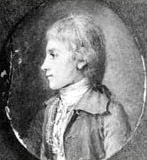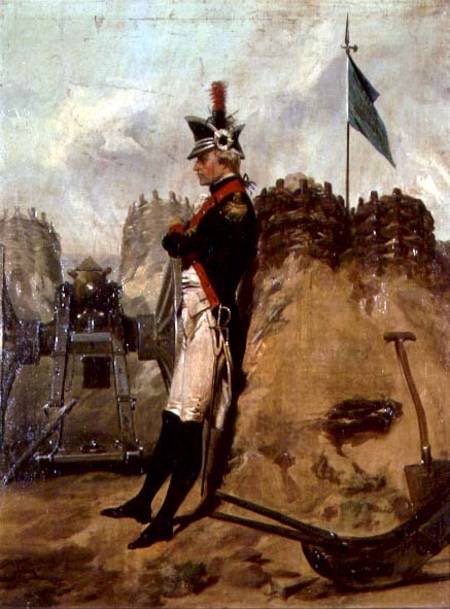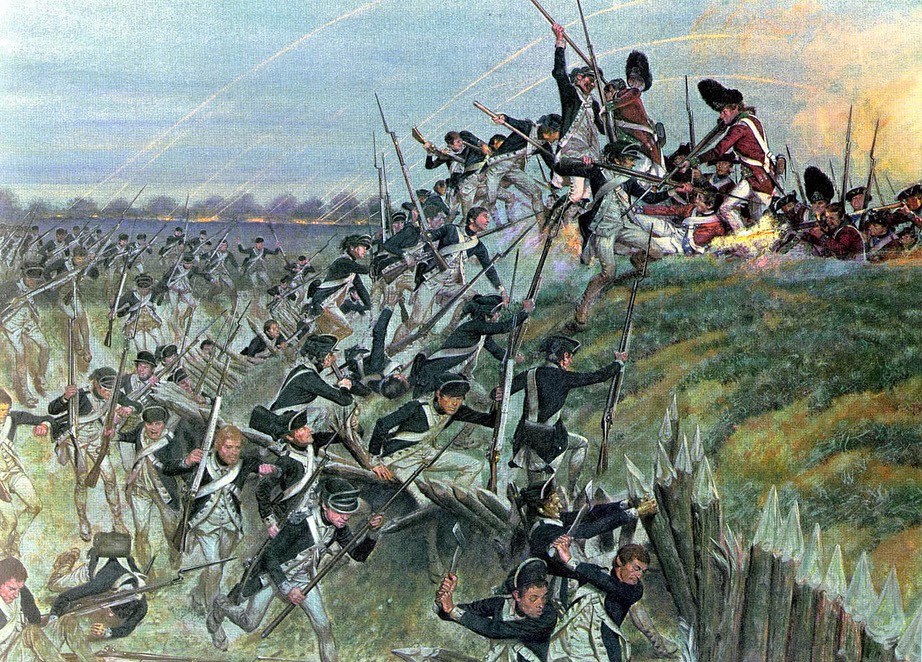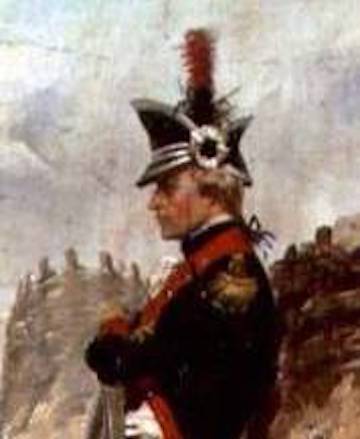Alexander Hamilton has hip-hopped his way back into America’s imagination lately, thanks to the hit Broadway musical that was recently translated to film. The vehicle for his revived fame is a strange one, and we wonder what he would have thought of it. Hamilton wasn’t musical (that was his arch-rival Thomas Jefferson), and he was neither hip nor inclined to hop. Rather, Alexander Hamilton was a serious young man who never had much time for jokes and would have found jive repellant. Yet there’s no doubt he would have loved the box office, and not for the money but for the acclaim. Hamilton hungered for acclaim, for celebrity, for the kind of renown that would lodge his name in every man’s mind and put it on every woman’s lips, purring. Alexander Hamilton had always wanted to take the world by the tail and shake it.

It seemed a hopeless dream for Hamilton the boy as he grew up. Born in the British West Indies in either 1755 or 1757 (the dates are muddled), Alexander Hamilton was the illegitimate child of a Scottish father and French Huguenot mother. His shady parentage in a remote place doomed him to a life he bitterly described as groveling. He learned a lowly clerk’s trade in a St. Croix store, but he also read voraciously and longed for something better. An agile mind, a flair for writing, and a sparkling personality impressed people while the lad was still in his early teens. Patrons arranged for his education in the mainland colonies. That was how he came to North America at just about the time the British colonists there were turning their quarrel with the mother country into a revolt.
As the quarrel became a revolution, Hamilton became a soldier. He joined an independent New York artillery company as a captain. Brash and daring with a presence to match his intellect, his bold demeanor compensated for a diminutive frame and an almost feminine face. In the spring of 1777, his superiors recommended him for a place on General George Washington’s staff. It was the pinnacle of a climb long by miles but short by the calendar: Alexander Hamilton had come a long way from his clerk’s counter in the Caribbean, but he was just shy of his twenty-first year when he found himself at the center of a great American enterprise in the company of its premier hero.
Congress gave aides the rank of major and later upped that to lieutenant colonel, which meant a significant promotion for young Captain Hamilton. The salary of $33 per month was never commensurate with his labors, but money never mattered to him. His indifference to material gain was something neither his friends nor his enemies ever understood.
For the meager pay, staff work was thankless and grueling. Aides wrote voluminous reports, copied them endlessly, and filed papers day and night. They indexed correspondence, drafted important proclamations to the army or communications to Congress, and handled hundreds of requests, queries, and instructions that swamped headquarters every hour of every day. Everyone had to write legibly as an essential talent of the job, but Hamilton’s superb handwriting resembled copperplate engraving. That alone would have made him a valuable addition to General Washington’s official “family.”
Even so, later events made Hamilton in retrospect something he wasn’t at the time. He was not George Washington’s most important aide, and judging him so would have surprised Washington as well as Hamilton’s colleagues. Hamilton was quite young and prodigiously gifted, but he served in the administrative and clerical trenches with many others not so young or nearly as gifted but equally and often more important. What distinguished Hamilton most, aside from a facile pen and a quick grasp of the complicated, were his romantic escapades and a hair-trigger temper. Both were because of youth, and George Washington overlooked them.
Everybody did. His fellow aides liked him. In another setting his talent could have excited envy, but the young men serving on Washington’s staff were all talented and brave into the bargain. Everyone groused about the ponderous paperwork, but they always beamed when pressed into service as couriers with the chance to get shot at. Hamilton especially relished those interludes. His bravery sometimes became bravado, but his colleagues didn’t mind. They appreciated daring and matched his with some of their own.
Washington liked Hamilton, and his patience was more elastic with the young man than with almost anyone else. In part, it’s easy to see why. George Washington understood courage and valued it in soldiers. As if on a Sunday stroll, he routinely walked parapets to pause over a battery’s placement even if enemy shells were plowing up proximate ground and bullets were shrill near everyone’s ears. Washington noticed companions who did not flinch. Lt. Col. Hamilton never flinched.
But he also had a way of getting into trouble. He expressed opinions openly and with little concern over how enemies might twist them. A story circulated that Hamilton was urging the overthrow of Congress and the installation of Washington as a dictator. Hamilton never said this, but it was a consequence of his reputation for audacity that some people believed he had. George Washington, on the other hand, defended his young aide and helped to quash the controversy.
Washington’s loyalty and friendship should have been reassuring, but ambition, pride, and anger ran strong in Hamilton. They nearly ruined his career. To be fair, incessant staff work eventually wore down the most conscientious aides, and it’s surprising that Hamilton didn’t tire of it sooner. Yet by late 1780, his desire for a field command all but consumed him. Martial glory earned with battlefield heroism wasn’t in the cards for a secretary. Though adorned with high rank and an impressive title, Hamilton began to feel much like a glorified clerk, little more than the storekeeper he had been as a boy. The war was slipping away from him. He seemed fated to end it as a talented scrivener occasionally running errands.
Hamilton grew restive and irritable about Washington’s failure to find him a place in the line. Worse, Hamilton began to suspect that Washington’s efforts were insincere and half-hearted. The commander-in-chief seemed to be stalling to keep the indispensable Alexander Hamilton at hand. The young man started to anticipate history’s erroneous estimation of him as the most important member of the headquarters staff.
In truth, Washington’s hands were tied by the politics of command and the fragile morale of his officer corps. In the fall of 1780, when Hamilton was beginning to chafe and churn over his status, the army’s adjutant general slot came open. Several of Washington’s advisors endorsed Hamilton for the post, but Washington had to appoint another man with longer experience and a more appropriate rank. Hamilton was worse than disappointed. He began to find fault with Washington. He discovered reasons to dislike him.
The aftermath of Benedict Arnold’s treason allowed Hamilton’s regrettable attitude to take root. He was livid over Washington’s decision to hang Arnold’s British liaison John André rather than have him executed by a firing squad. Hamilton thought hanging did a brave fellow officer a dishonorable and shabby disservice, but Washington dismissed such romantic notions. Arnold was a traitor, which made André a spy. Captors hanged spies. Case closed. Hamilton remained unconvinced and openly critical. Washington kept his mind open and his mouth shut about Hamilton’s statements that bordered on insubordination.
Still sulking over André’s fate, Hamilton was not particularly grateful when Washington granted him leave to marry Elizabeth Schuyler, General Philip Schuyler’s daughter. The match launched Hamilton into the highest circles of New York’s gentry class, and when he resumed his staff duties at Washington’s headquarters the change in his social status seems to have encouraged impudence to the point of open disdain.
That was the state of affairs when events propelled these two men toward a serious altercation. Hamilton was bruised by his perception of personal slights, and Washington was at the end of his tether over the war. At the start of 1781, everything was turning rotten for the Americans. Lord Cornwallis was rampaging through the Carolinas. Serious mutinies were breaking out in the Continental Army. Washington could not find men to replace those who deserted. He lost sleep over public apathy and congressional impotence.
And so the breach between an anxious and an angry man happened. It was on February 2, 1781. Careworn and preoccupied, Gen. Washington told Lt. Col. Hamilton that he needed to speak to him. The two were on the stairs at headquarters. Hamilton said he was on his way to deliver some paperwork. Washington told him to come to his office when he finished the errand. But Hamilton did not do that. As he returned to headquarters, he encountered the Marquis de Lafayette and a few pleasantries turned into a conversation.
It was likely lengthier than it should have been because it was a treat for Lafayette. His English was sketchy, and Hamilton’s French was fluent. Washington was waiting at the top of the stairs and heard the exchange, but he didn’t understand a word of it. Washington could not speak French, so he thought the worst and expressed it when Hamilton finally said adieu to the marquis and began climbing the stairs to Washington’s office.
“Colonel Hamilton,” he growled, “you have kept me waiting at the head of the stairs these ten minutes.” Hamilton’s eyes narrowed. Washington continued, “I must tell you sir, you treat me with disrespect.”
Like a primed gun, Alexander Hamilton’s temper snapped its trigger. “I am not conscious of it, sir, and since you have thought it necessary to tell me so, we part.” The colonel wheeled and stalked down the stairs. The general walked into his office and slammed the door.
What happened next laid bare the two men’s respective strengths and weaknesses. At this pivotal moment in their relationship, they became a study in contrasts. Theirs was more than the difference that sets the wisdom of age apart from the impetuosity of youth.
For his part, Alexander Hamilton had over-reacted. By insulting the only man who could give him a chance to earn it, Hamilton had smashed his dream for military glory. Even more, his casual disregard for Washington’s schedule was inexcusable in a subordinate. His impertinence when called on his behavior should have ended his military service. Alexander Hamilton should have been packed off within hours, cashiered from the army, and sent home to the Schuylers. With that as his fate, he would have been nothing more than a poor boy who married up. He would have been successful at whatever he did — Hamilton was too talented to be otherwise — but it would have been as a local lawyer, as a squire raising with Betsey a growing brood.
His contribution to his country would have been bland enough for a passing mention in history books. Footnotes might have included a few biographical details. Early in Hamilton’s service on Washington’s staff, a visitor to headquarters had described him as “a sensible, genteel, polite young fellow, a West Indian.” After the exchange on the stairs that February 2, that, and that alone, was all Alexander Hamilton would have ever been. No musical, no Tony, no Pulitzer, no box office — no notices.
Except for the fact that within minutes after George Washington slammed his office door, he was ashamed of himself. It was no excuse for him that his ragged army was up in arms, that his enemy was ravaging the country unchecked, that Congress barely answered his letters, that the people barely acknowledged the war, that he lay tormented in his bed at night sleepless and edging toward panic. He had lost his temper with a free-spirited boy he liked because another free-spirited boy he liked wanted to have a chat in a lingo he didn’t understand. General Washington called in one of Hamilton’s friends and asked him to have a talk with their mutual friend.
It was more than a clear gesture of apology. It was an act so generous by a commanding officer toward a subordinate that Hamilton’s churlish response to it shocks as much as it bewilders. The young man, from the Olympian perch of his 23 years, had grown to despise George Washington. He revealed his feelings to his father-in-law. Schuyler read Hamilton’s self-serving letter describing the disagreement. He set it aside with a mixture of alarm and astonishment. The alarm was over his son-in-law’s insolence. The astonishment was over his son-in-law’s vicious description of Washington as vain and ill-tempered, as rude to his staff and demanding of his subordinates, imperious in attitude and indifferent to the feelings of others. “For three years past,” Hamilton snarled, “I have felt no friendship for him and have professed none.”
Hamilton’s attitude was actually worse than Schuyler knew. He interpreted Washington’s efforts to reconcile as proof that the general couldn’t do without him. Hamilton gloated, “He shall, for once at least, repent of his ill-humour.” The supposedly indispensable young man grudgingly consented to stay on staff, but only until Washington could replace him — or, as Hamilton likely thought, until Washington could find a substitute. Hamilton believed he was irreplaceable.
Meanwhile, he had the audacity to lodge a couple of requests with the commanding general. The first was for a field command, a repeat of his persistent wish. The second was that Washington refrain from mentioning their disagreement. Washington again promised to search for a field command, but Hamilton was past believing him. Washington also consented to remain silent about their quarrel, but Hamilton’s behavior indicates he didn’t believe that either. While he bound Washington to silence about the matter, Hamilton spilled his version of the event not only to his father-in-law, but to Lafayette and at least one other officer. Washington learned of this and was more puzzled than angry. “Why the injunction on me,” he wondered, while Hamilton was talking freely to whomever would listen. It was, Washington said, “a little extraordinary.”
It was more than a little extraordinary. It was surreal. Hamilton came to believe that he was performing a great service to the American cause by not revealing to a wider audience what George Washington was really like. “I think,” he mused, “it is necessary that he should be supported.” And so the self-important young aide performed the great sacrifice of living in limbo. He remained at headquarters on staff but was chilly and unpleasant toward Washington. The commanding general let it all go. There were no more overtures and no additional efforts to mend the breach.
Yet even more extraordinary than what had passed so far, Washington continued his efforts to find Hamilton a field command. One would be tempted to think his motivation was to get rid of a sullen subordinate, but he took pains to place Hamilton. The opportunity came when Washington reorganized the army to conduct the campaign with the French against Cornwallis, who had moved into Virginia on the York Peninsula. Just six months after Hamilton’s insolence on the stairs at headquarters, Washington appointed him to lead a new battalion that was created by joining the 1st and 2nd New York Light Infantry in the Marquis de Lafayette’s part of the army. Lt. Col. Hamilton was no longer a member of Washington’s official “family.” His dream had come true.
At least, in part. The French-American operation against the British at Yorktown was a siege rather than a battle, which meant that it consisted of engineers plotting trenches, sappers digging them, and gunners hefting bombarding batteries ever closer to the enemy. The siege began at the end of September 1781, progressed rapidly, and Hamilton squirmed at the likelihood of inaction during the last engagement of the war.
Then the siege lines reached a critical point. Cornwallis had constructed ten strongholds to protect his army. Two of them posed an obstacle to the final stages of Washington’s siege. Two of these temporary forts later became famous as Redoubts 9 and 10. The French and Americans had to take them to continue the campaign.

Lafayette assigned command of the attack on Redoubt 10 to his chief aide, and Alexander Hamilton saw his last chance for command in battle slipping away. He grasped at a technicality. Because he happened to be officer of the day on the day designated for the attack, he claimed the right to command it. Lafayette refused. As a last resort, Hamilton appealed to George Washington to countermand Lafayette and make Hamilton the commander of the assault. Washington briefly perused the paperwork and quickly made his decision. He gave Hamilton command.
The October 14 attack on Redoubt 10 took place after sunset to cover the dangerous advance with darkness. Col. Hamilton was audacious and fearless. Flourishing his sword and reaching the redoubt’s abatis, he ignored the protocol of calling in engineers to remove the obstacles. Instead, he vaulted over the sharpened points of the felled trees and stood in heroic silhouette on the redoubt’s parapet, urging his men to rush the fortification. Back at the main American lines, George Washington heard the field in front of him go quiet. Then a cheer in the distant darkness, recognizable as from the New York Light Infantry, reported the successful attack. Always calm and impassive, Washington must have exhaled quietly in relief, for many reasons. It had taken ten minutes. Two days later, Cornwallis asked for terms of surrender. The major fighting of the American Revolution was over. Independence was gained.

Washington’s and Col. Hamilton’s contact afterward was slight. From the man he despised, Hamilton received a lengthy furlough that was actually a release from duty so he could begin his study of law to support his family. Technically, he remained in the army until his resignation the following spring. It followed a brief visit to George Washington in Philadelphia. Neither left a record of their conversation
The long road from St. Croix to Redoubt 10 was a mixed journey for the illegitimate boy who by chance landed amid military authority and married well. He gained the unswerving loyalty of a man he childishly disdained, and because of that, he ended the war in a vivid action that rivaled Henry V’s “happy few” on St. Crispin’s Day. It was enough achievement for a lifetime.
Yet a few years later, Alexander Hamilton, older and wiser if no less brash, met George Washington again. A few months after that, he heard from the president-elect. Washington had something else for Hamilton to do.

